Life is incredibly busy for 30-year-old Kory Coleman. Between taking a full student course load at the University of Oregon, working for landscape and grounds management on campus and parenting a four-month-old baby, he barely has time to breathe. Coleman hopes to graduate UO with a Bachelor of Science in General Social Sciences by the end of winter term.
“It’s difficult because I work really, really hard to get those grades,” he says. “I definitely put a lot of energy into getting my 3.9 GPA at Oregon.”
Although things are productive now, life hadn’t always looked so good for Coleman. Pursuing academics seemed like a distant dream to him less than a decade ago. He’s now six years clean from an opioid addiction.
Though Coleman’s journey has been challenging, he says that surviving past traumatic experiences and overcoming his relationship with opioids have only made him a stronger person.
Opioid addiction is prevalent in Lane County. According to Serenity Lane, a local alcohol and drug sobriety clinic, 20 percent of Oregon’s population uses illicit drugs. And the Oregon Health Authority reports that an average of five Oregonians die weekly from opioid overdoses.
Oregon recently passed Measure 110, which decriminalizes the personal possession of small amounts of illicit drugs such as heroin, cocaine and methamphetamine. It also allocates funds from legal cannabis taxes to addiction treatment programs and health assessments.
According to the measure proposal, criminalizing addiction from illicit drugs prevents people in recovery “from getting housing, going to school, getting loans, getting professional licenses, getting jobs, and keeping jobs.” Supporters of the measure say its passing will help people who have a history with illicit drugs like Coleman to restart, take out loans or go to college without a criminal record burden. Oregon is the first state in the nation to decriminalize possession of these drugs.
People pass moral judgments on those who abuse substances, according to PsyD Daryl Holloway, a Psychologist Resident with the Collegiate Recovery Center of UO.
“There’s a stigma that continues to exist really prominently in the world of substance use and recovery,” Holloway says. “People from the outside looking in may be placing some moral assumptions on these individuals based on their use.” Coleman is a person who has a life outside of his experience with drug use and feels that his past doesn’t define him.
The Collegiate Recovery Center is a resource for students looking to manage recovery alongside their academic pursuits. The program fosters support and community for students on the road to recovery. “Every single one of us has a story,” Holloway says. “That story, although it looks different for every single individual, has commonalities.” Coleman is one of the students who use this resource.
Coleman spent his childhood in the town of Leaburg, Oregon. He describes the area as a “little country town where everybody knows everybody.” Coleman recalls how great the summers were growing up there — lots of bike rides with neighborhood kids and sunny days. But Leaburg is also where Coleman experienced a lot of childhood adversity.
The first event that impacted Coleman was when his grandfather suddenly passed away. He was eight years old at the time, out on an elk bowhunting scouting trip with his dad. “Grandpa Chuck, my dad’s father, was a big role model for me,” Coleman says. “It had such an effect on me. I was outside the funeral home puking. I was just super out of sorts. I didn’t feel safe.” One of the things that scared Coleman most was seeing his dad so vulnerable. All he craved was a sense of stability.
Healing after his grandfather’s passing brought a lot of positivity, Coleman says. He and his sister Ashlee Coleman, who fought often, started to form a significant bond while their father, Brad Coleman, worked.
But less than three years later, in 2001, his nine-year-old sister was killed in a car accident. Coleman was devastated. A man in a Subaru Outback hit his sister and also clipped Coleman’s friend while they were crossing the street, he says. “I had that hope of an 11-year-old that was like, ‘Oh, this is like going to be a Disney movie. She’s going to bounce back.’ And that wasn’t the case.” He was at home doing schoolwork during the time of the accident.
Coleman describes the feeling of hearing the news as a deep and heavy emotional pain. The fact that his sister wasn’t coming back was challenging for Coleman to grapple with. He still remembers arriving at the accident. “I ran up to the scene and there was a little body with a blanket laying over it across the highway,” Coleman says. “I couldn’t stop thinking ‘This is a fucking nightmare.’”
It wasn’t long until tragedy struck again for Coleman and his family. His father had been experiencing horrible headaches, which nearly blinded him with pain, according to Coleman. Eventually they went to the emergency room. Doctors found a tumor in his head and discovered that Coleman’s father had brain cancer. “I just remember walking into the emergency room crying,” Coleman says. “And I just looked at one of the cupboards and thought ‘Fuck, what’s next?’”
Doctors estimated that his father only had six months left to live. His dad, although forever changed from the effects of brain cancer, is still living today. Coleman now spends meaningful time with his dad — they go out to eat often and hunt together.
Childhood trauma and substance abuse have a high correlation rate, according to the U.S. National Library of Medicine. Over 70 percent of people who use substances as a means of coping have experienced childhood trauma. One of the reasons adults often have substance use disorders after experiencing trauma in their youth is to self-medicate and dampen the side effects of post-traumatic stress disorder. Although children who experience trauma have a higher rate of psychiatric disorders, such as depression and anxiety, The NLM also found that adults who’ve faced childhood trauma are incredibly resilient.
It wasn’t until late in high school that Coleman started using drugs and alcohol. He met friends that encouraged drinking after school and on the weekends or smoking weed after cross country practice. For a long time, Coleman says, he’d been invested in school and sports. But after a while he found himself shifting his priorities to fit a different lifestyle. “I went from drinking apple juice to taking bong rips,” he says.
Under it all, Coleman says he was using substances to escape the pain from everything he’d been through. “But the pain would always just constantly be there,” Coleman says. “This undercurrent of just sheer terror, really.”
Despite his outlook on college in high school, Coleman ended up attending Lane Community College. “I had a bunch of homies that went to Oregon, and I remember knowing that there was a part of me that still gave a shit about school, but it was a very small part of me,” Coleman says. His addiction dramatically escalated from there.
Coleman’s GPA for his first term at LCC was 0.0. He stopped going to class, and he used the majority of his financial aid to buy weed, which he would either sell or smoke.
He started dabbling with harder drugs like oxycodone, an opioid, soon after a breakup. Coleman says that he started hanging out with questionable people and making poor choices that he usually would never make. “I felt like a completely different person,” he says. “I stole like 800 bucks from my dad — the dude that I held in such high esteem. I stole that from him.”
He used the money in less than a day. Coleman remembers moments of feeling like he was getting away with something, like nobody could tell what he was up to. When his family caught on to his drug use, they put him through rehab. However, Coleman says that being forced to seek help didn’t work for him.
Eventually, Coleman reached a breaking point of helplessness. He says that he felt sheer desperation, and he needed some support. “I just remember feeling like, holy shit,” he says. “I’m either going to die, or I’m going to go to prison. And I hope I go to prison.”
When his mom invited him to join the family on Christmas of 2013, he came out and asked for help. Coleman was high on heroin when he arrived at the gathering. He was afraid he wouldn’t make it to another Christmas. “There were a good amount of people there,” he says. “I was like, ‘Yo, I’m a heroin addict. And I’m probably gonna die. And I need help.’” Coleman decided to take another chance on rehab, and that’s when things started to take a turn for the better.
This time, Coleman was determined to work on himself instead of avoiding it all, which made his second attempt at getting clean more successful. Entering Narcotics Anonymous, a program focused on community and guidance to reach a full recovery, early in the recovery process was a tool that he says helped a lot.
Recovering from an opioid addiction, particularly heroin, can be a long and arduous process. In the United States, 85 percent of people relapse during treatment, according to an American Addiction Centers report. It is not uncommon for former drug users to fall into some regression. Coleman relapsed twice in his life: once when his family encouraged rehab and again on his own quest to sobriety.
Persistent treatment encourages individuals to stop using heroin and to remain sober, according to American Addiction Centers. A combination of medically-supported detox, behavioral and motivational therapy, family therapy and basic nutrition and exercise programs are critical in avoiding further relapse.
Although he had been doing better on his second journey through recovery, he relapsed again. After a day at work, he went and got high in Eugene. He says he felt giddy once he made the decision, like a child going to Disneyland. However, Coleman says he felt incredibly guilty afterwards, and he broke down crying from all of the regret. Coleman was determined to stay clean after that experience.
“I just felt so guilty because I actually tried that time,” he says. It’s now been more than six years since Coleman has touched opioids. “A lot of it just took me like slowing it down, taking it day to day.”
After deciding to give school another shot, Coleman took a course at Central Oregon Community College that he’d previously failed three times at LCC. This time, however, he got an A.
In 2019 he was accepted into UO and is now working toward his General Social Science degree to become a teacher. Even though he received several awards and scholarships, Coleman says he criticizes himself a lot for being an unconventional student.
“I wish I could pat myself on the back more,” he says. “A lot of really negative language can still come into my head about where I need to be and what checkpoint in life I need to be at based on my age.”
Despite the difficulties, Coleman says that he’s always finding ways to improve his outlook and to be the best version of himself. On a recent run at Mount Pisgah, Coleman decided to honor his sister Ashlee by staying committed to sobriety, his partner and his new baby.
One of the benefits Coleman recognizes about his past is that he’s gained a lot of unexpected tenacity from it all. “I just don’t give up easy on shit. And part of the reason I think I have high grades is that I don’t make excuses,” Coleman says. “I just do this stuff. And if I don’t know how to do it, I will know how to do it.”
Coleman and his partner, Alexis Shofstall, hold their son, Flinn Coleman, outside their home in Springfield, Ore. Between working for the University of Oregon’s landscaping team, going to school full-time to become a social studies teacher, taking care of his dad and becoming a father, Coleman doesn’t get much downtime. “Going to school with a baby is hard. It takes commitment,” he says. “I’ve learned how not to give up.”


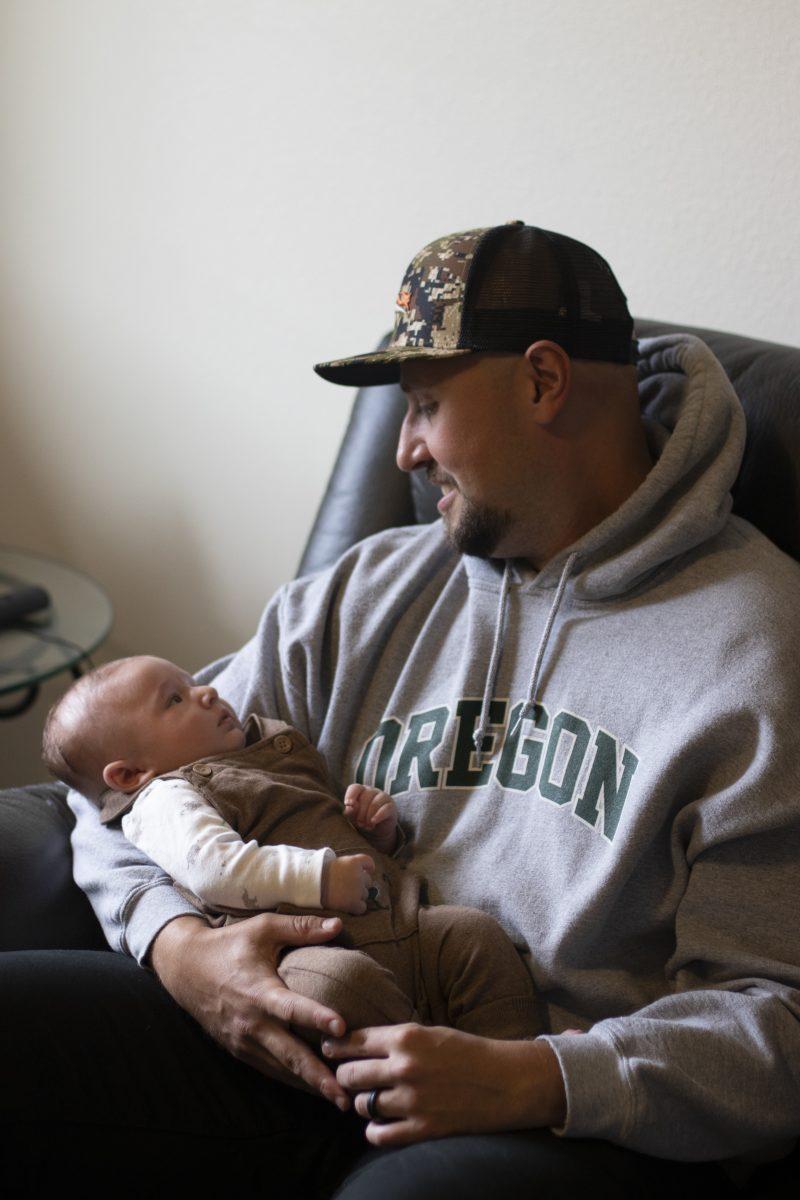
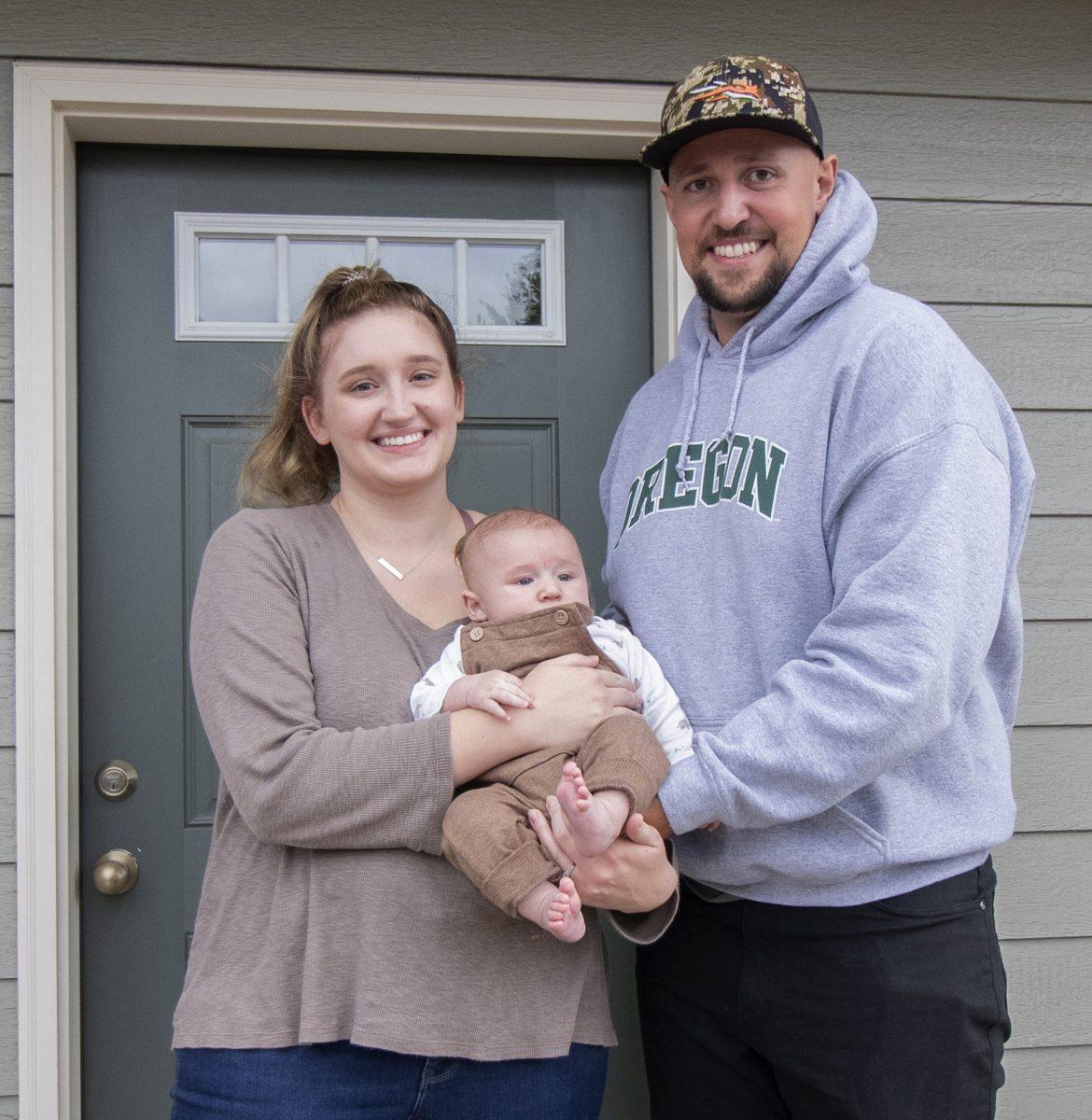
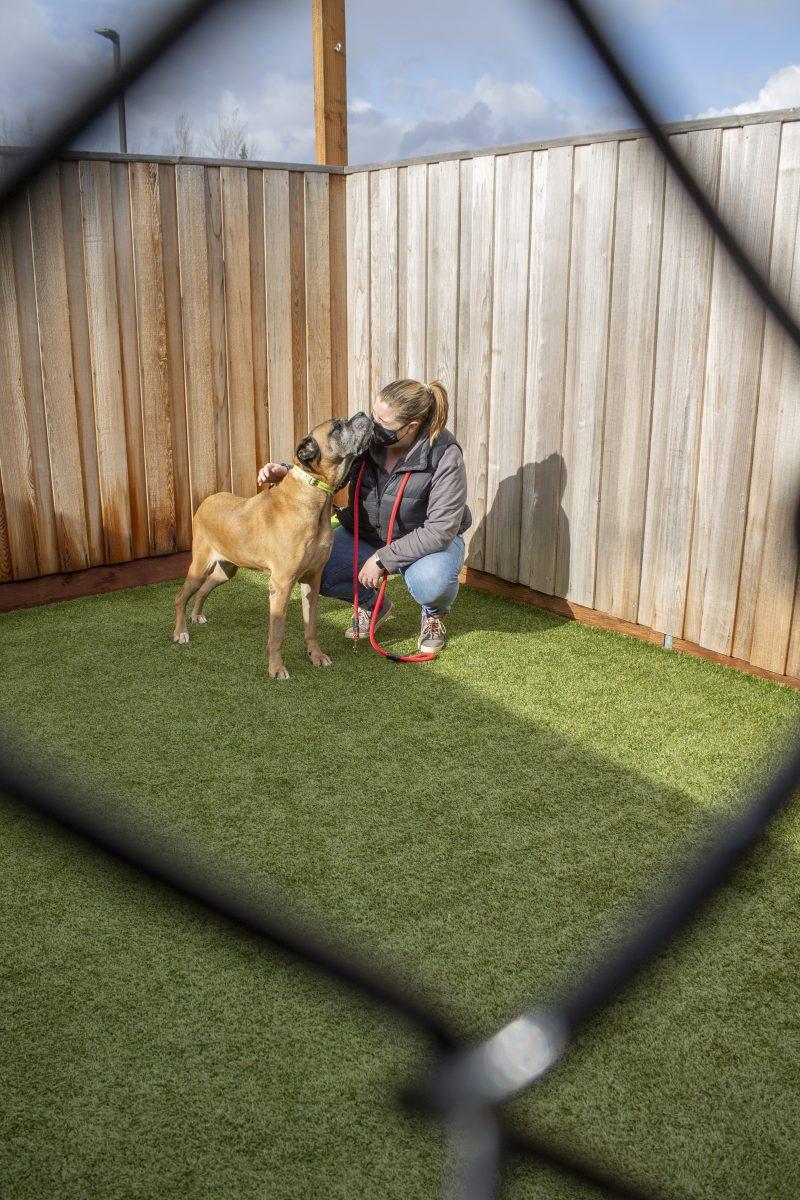
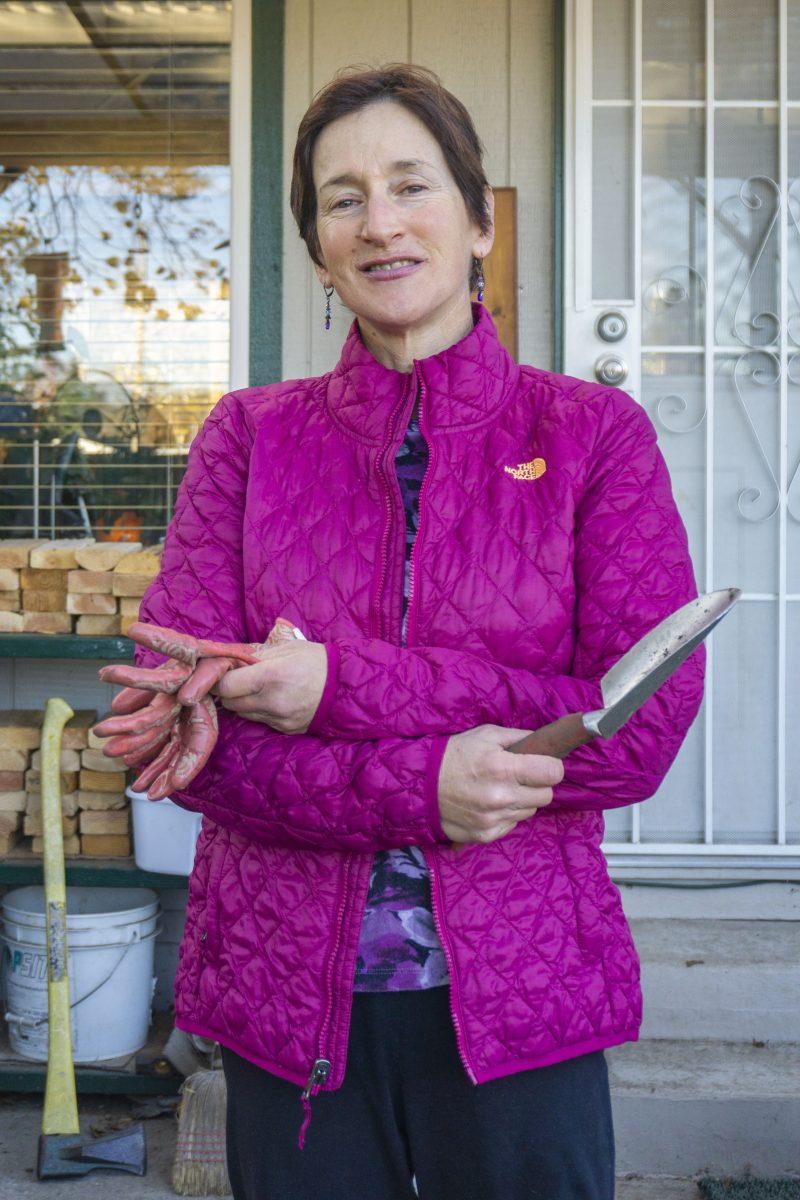


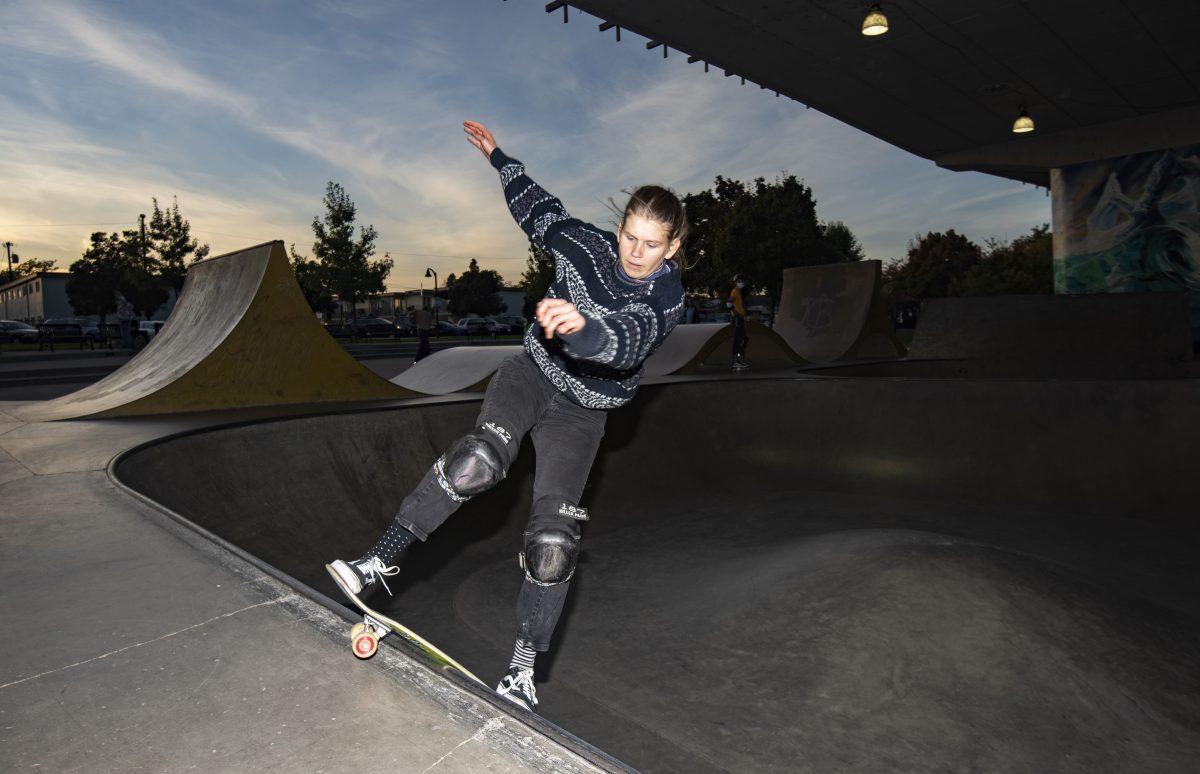



![[Photo Courtesy of the Lara Family]
Ruben embraces his beloved childhood goat, Katrina.](https://ethos.dailyemerald.com/wp-content/uploads/2025/05/katrina-1-1060x1200.jpg)


